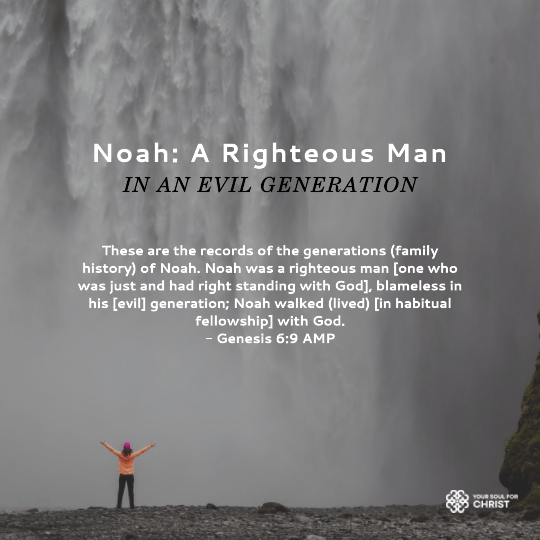These are the records of the generations (family history) of Noah. Noah was a righteous man [one who was just and had right standing with God], blameless in his [evil] generation; Noah walked (lived) [in habitual fellowship] with God.
Genesis 6:9 AMP
In the chronicles of Genesis, we encounter the remarkable story of Noah. He was a man who stood out as a beacon of righteousness in the midst of an exceedingly wicked generation. In Genesis 6:7-8, God found Noah righteous and chose to spare him and his family amidst His judgement to destroy the world because of its evil. Heaven rejoices when God beholds a life characterized by righteousness and unwavering faith. Noah’s life, like Job’s (Job 1:8), brought a smile to the Creator’s face. God hailed both of them for their blamelessness and upright living. Genesis 6:9 poses an answer to the question: “What was it that distinguished Noah from the rest?“. Likewise, it also resonates with a critical message: the importance of our motives in approaching God.
This post delves into the extraordinary life of Noah, exploring how his example should challenge us to live lives marked by righteousness and unwavering faith in a world that often seems at odds with such values.
In a world corrupted by sin, Noah’s life was a source of joy in heaven. Our lives, like Noah’s, should be a testament to the power of habitual fellowship with God and standing firm in righteousness, irrespective of the evil that may surround us. Are we, as Christians, leaving a similar positive impression on the world around us? Are we living righteous lives, or do our actions bring reproach upon the Church and our faith? In examining Noah’s example, we discover that an ordinary person can indeed lead a righteous life, even in the midst of an evil generation. The evil of Noah’s time was not a mere aspect; it was the defining characteristic of his generation.
In the Christian walk, we have no excuse for unrighteousness. Christ’s sacrifice has granted us access to righteousness through faith, by grace. We can’t attribute our unrighteousness to the evil of our generation or our circumstances. If individuals like Noah, Elijah, Gideon, Daniel, and Job could maintain their righteousness and be useful to God in their respective generations, there’s no valid reason we can’t do the same. Our duty is to stand for God and bring glory to His name.
What sets Noah’s righteousness apart is the nature of his walk with God. His motive in approaching God was not about what he can get from God. Instead, he walked and lived for a relationship with God. He didn’t sporadically engage in righteous living; he habitually walked in fellowship with God. He didn’t limit his righteousness to specific times or places; it was a lifestyle that everyone could attest to. Despite living in a society characterized by wickedness, Noah’s commitment to God remained unshaken. Even if he was ridiculed or despised, he would not compromise his continual fellowship with the Creator.
The Lord then said to Noah, “Go into the ark, you and your whole family, because I have found you righteous in this generation.”
Genesis 7:1 NIV
Noah’s righteous character extended to his role as a family man. In a unique position as a father, he not only had to answer for his life but also for the spiritual condition of his entire family. Husbands today, likewise, are tasked with great responsibilities. The Bible teaches that they should lead their families in the ways of God. Ephesians 5:23 emphasizes this role. As fathers and husbands, we have the responsibility to stand as spiritual leaders and preserve our families by walking in righteousness.
In conclusion, Noah’s life is a testimony to the possibility of living a righteous existence in a fallen world. His commitment to habitual fellowship with God and his faithfulness as a family man are lessons that challenge us to evaluate our own lives. As Christians, our calling is to stand for righteousness and shine as beacons of God’s light in the midst of a dark and sinful generation. Just as Noah pleased God, let our lives also bring joy to our Heavenly Father.




